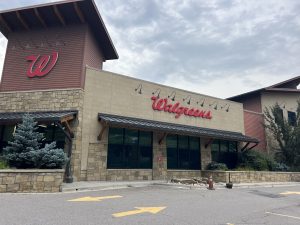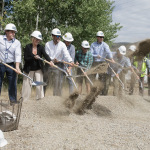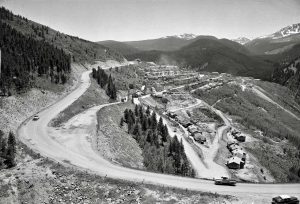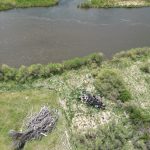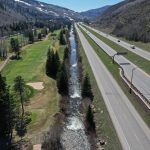Vail lauded as a top municipality for recycling, composting in 2022 statewide report
The town is acknowledged for its 35% recycling and composting rate, which is more than double the statewide rate

Carolyn Paletta/Vail Daily Archive
Vail was recently celebrated as the municipality with the third-highest citywide recycling and composting rate in the 2022 State of Recycling and Composting in Colorado report. With a rate of 35% across both commercial and residential properties, the town falls just 2% below Durango and 9% below Boulder, which were ranked No. 1 and 2.
The rate is more than double the statewide rate in Colorado, which hit 16% in 2021, and only slightly above the national average of 32%.
The statewide report is produced annually by Eco-Cycle, a Boulder-based nonprofit providing support for zero waste solutions, and CoPIRG, the state chapter of a national nonprofit advocacy and research and organization. This is the sixth year the report has been produced.
On Tuesday, during a Zoom call announcing the 2022 report and its findings, Suzanne Jones, the executive director of Eco-Cycle, said that the report provided “sobering news” on how far the state still needs to go.
“Colorado continues to landfill more and recycle less than its peer states and the national average,” the report states, adding that of the 6 million tons of material sent to the landfill in 2021, 95% of it could have been either recycled or composted, leading it to be ranked among the worst 20 states for recycling and composting.

Support Local Journalism
The reason these numbers matter, Jones added Tuesday, is that the 1.1 million tons of materials that were either recycled or composted across Colorado in 2021 reduced carbon emissions equivalent to taking 430,000 cars off the road for a whole year.
The report emphasizes that “convenient access” to curbside recycling services is one of the main challenges inhibiting the growth of recycling and compost numbers. The report found that on average, only an estimated 30% of Coloradans have guaranteed access to curbside recycling, meaning they have recycling pickup alongside trash service.
“That is a huge concern,” Jones said. “If you’re living in an apartment complex or in a rural corner of the state, your access to recycling is even less.”
In Eagle County, universal recycling is only required in the town of Vail, which passed the measure in 2014. The town of Avon is on its way as it recently passed an ordinance that will require universal recycling in the town starting in November 2023.
Vail’s rising diversion

The State of Recycling and Composting in Colorado 2022/Courtesy Photo
During Tuesday’s virtual press conference, several communities across Colorado — including Vail — were celebrated for their higher diversion rates through the progress made in various recycling or composting programs.
“The town of Vail has done some pretty significant things in the past year… chief among them, I believe, is expanding composting,” Jones said. “Vail has climbed to a 35% residential and commercial recycling and composting rate, which puts you in the running to be one of the leaders in the state, so you’re doing something right.”
According to the 2022 report, the statewide leaders based on diversion rates have five commonalities: universal curbside recycling, volume-based pricing for trash, convenient drop-off centers or curbside programs from organic materials, strong education for residents and businesses, as well as dedicated staff and funding for waste diversion programs, services and infrastructure.
Beth Markham, the town of Vail’s sustainability coordinator, joined representatives from the city and county of Denver, Summit County, Otero County and Durango to showcase how communities from all four corners are toppling statewide rates.
Markham highlighted several programs that the town of Vail has deployed to increase its diversion rates. Included on the list is the 2014 passage of pay-as-you-throw and universal recycling, the town’s implementation of a disposable bag fee in 2015, the launching of a curbside compost program in West Vail in 2021, as well as a recently launched business compost pilot program.
“Organics make up at least 30% of the waste going to the landfill and there are climate implications of that with the methane that’s produced and so, it’s really important for us to take a look at how we’re going to divert those organics,” Markham said. “We are really fortunate in Eagle County to have a local compost facility that Vail Honeywagon runs. So, getting that up and running was huge, which happened a few years back. Now, it’s the effort of actually getting that facility utilized.”
The most recent effort with its businesses offers a solution for a challenge that many Western Slope communities face with regard to their tourism-based economies.
“We’ve really been working with a lot of local businesses to get, especially the restaurants, to get them on board with the composting and getting those organics diverted,” Markham said. “We have a lot of visitors and a lot of tourism in Vail, so if we can get some of those hotels and restaurants on board as well that will just continue to increase our diversion rate.”
Currently, she added, the town has 25 businesses actively participating in composting.
The town of Vail is also currently working to revise its bag fee program in accordance with the recently passed Plastic Pollution Act. While the town previously passed a bag fee for large grocers, when the new law goes into effect in 2024, the ban on plastic bags will be extended to certain restaurants and retailers, and a new ban on polystyrene food containers and cups will be instituted.
Additionally, this bill will lift restrictions on local municipalities and counties, allowing them to implement and enforce more stringent laws around packaging. While not finalized by the Vail Town Council, discussions are underway to increase the bag fees, change the fee split, remove exemptions so the ban applies to all businesses and more.
“There’s just a lot of different irons in the fire to really work toward increasing diversion rates,” Markham said, later adding that being on the call and hearing about composting efforts in other parts of the state “gives me a lot of hope for Eagle County and Vail to really up our game with the compost. We’ve dipped our toes, but now it’s time to go full throttle.”
Statewide transformation ahead

Chris Dillmann | Vail Daily Archive
While the report had dismal statewide numbers, Jones emphasized that with policies popping up at the state, county, and local level, Colorado is “poised for a recycling revolution in the next few years.”
“Recycling and composting are really among the easiest and yet most impactful ways that we can contribute to the health of our planet and also the resiliency of our communities,” said Marlon Reis, Colorado’s first gentleman, at Tuesday’s event. “As this year’s report shows, Colorado has taken several giant leaps forward to make our state a recycling and composting leader.”
Specifically, at the state level, this includes the recent passage of two bills.
The first, known as the Producer Responsibility for Recycling Act, will provide all Coloradans with convenient and free recycling services, and ensure a steady supply of recycled materials for businesses to use in production. The second creates a Waste Diversion and Circular Economy Development Center, which will create new end markets for recycled materials and provide the necessary infrastructure, systems, logistics and marketing to do so.
Danny Katz, the executive director of CoPIRG, said that these pieces of legislation will help do several important things. This includes making sure materials can be turned back into something that can be reused; providing equitable, convenient and widespread access to the collection of recyclable materials across the state; increasing facilities and infrastructure dedicated to this circular economy; providing consistency around what is recyclable, as well as creating a steady and large supply of recycled materials for end markets.
“Our future success as a state depends on the actions we take today to care for tomorrow,” Reis said. “We’ve always been a state of people who value the beauty of nature and the natural treasures that we have in such abundance and these laws are proof positive of that commitment to protect what is most precious.”


